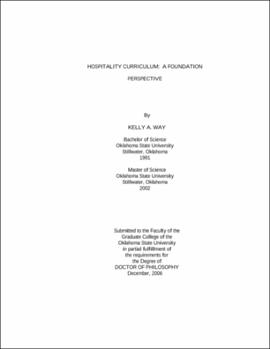| dc.contributor.advisor | Moreo, Patrick | |
| dc.contributor.author | Way, Kelly A. | |
| dc.date.accessioned | 2013-11-26T08:33:27Z | |
| dc.date.available | 2013-11-26T08:33:27Z | |
| dc.date.issued | 2006-12 | |
| dc.identifier.uri | https://hdl.handle.net/11244/7284 | |
| dc.description.abstract | Scope and Method of Study: The purpose of this study was to research hospitality curricula and their components, including the curricular areas that are deemed most crucial to hospitality curricula being taught by hospitality educators and hospitality practitioners. This study will assist hospitality educators when developing or redeveloping hospitality curriculum that is applicable to four year programs granting bachelor degrees in hospitality administration. the a sample was chosen of the current members of the International Council of Hotel, Restaurant, & Institutional Education (I-CHRIE), members of the Colorado, Connecticut, Oklahoma and Wisconsin Restaurant Associations, and members of the Colorado, New York City, Oklahoma and Wisconsin Hotel and Lodging Associations. The questionnaire was developed through a literature review and evaluation of focus group findings. The study employed a self-administered survey with four major sections. | |
| dc.description.abstract | Findings and Conclusions: Four thousand one hundred and forty seven surveys were distributed via electronic mail. Three hundred thirty eight usable surveys were returned for a response rate of 9.59%. The average respondent this study was male (58.33%) ranging in age from 50-59, while 41.66% of the respondents were female ranging in 40-49 years of age. Hospitality educators made up 36% of the respondents while hospitality practitioners were 64% of the respondents. | |
| dc.description.abstract | The findings of this study indicated that the respondents were in agreement that there should be a form of student assessment prior to graduation but were equal in agreement if the form of assessment should be a written or oral exam. The study found that the respondents felt that a standardized curriculum would produce a better quality graduate but would not assist educators when designing or redesigning a hospitality curriculum. The findings indicated that hospitality educators are open to hospitality practitioners' guidance, support and input when regarding the hospitality curriculum. | |
| dc.format | application/pdf | |
| dc.language | en_US | |
| dc.rights | Copyright is held by the author who has granted the Oklahoma State University Library the non-exclusive right to share this material in its institutional repository. Contact Digital Library Services at lib-dls@okstate.edu or 405-744-9161 for the permission policy on the use, reproduction or distribution of this material. | |
| dc.title | Hospitality curriculum: A foundation perspective | |
| dc.contributor.committeeMember | Carlozzi, Al | |
| dc.contributor.committeeMember | Kim, Woo Gon | |
| dc.contributor.committeeMember | Ryan, William E. | |
| osu.filename | Way_okstate_0664D_1998.pdf | |
| osu.accesstype | Open Access | |
| dc.type.genre | Dissertation | |
| dc.type.material | Text | |
| thesis.degree.discipline | Hospitality Administration | |
| thesis.degree.grantor | Oklahoma State University | |
